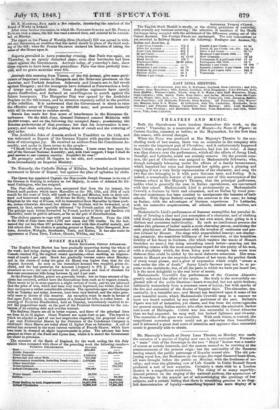THEATRES AND MUSIC.
Both the Operahouses have betaken themselves this week, on -the " extra " Thursday, to a masterpiece of Mozart—Le Piazze di Prime*: 'at Covent Garden, repeated, as before; at -the Haymarket, for the first time- this season, with several changes.
When the Nome was produced at Her 'Majesty's Theatre in the con- cluding week of last 130119311, there was no contralto in the company able to sustain the important part of Cherubim; and it-unfortunately happened that Coletti, who performed Count Aitnaciva, had lost his voice. A damp was thus thrown over the performance, which all the efforts of Jenny Lind, Staudigl, and Lablaohe could not entirely remove. On the present occa- sion, the part of Cherubino was assigned to Mademoiselle Schwartz; who,. though unhappily labouring under the effects of a family bereavement, which impaired her voice and depressed her spirits, gave a pleasing and engaging if not a very lively representation of the character, and sang the two fine airs belonging to it with pure German taste and feeling. It is, indeed, a remarkable feature of the present cast of this masterpiece of the German school at Her Majesty's Theatre, that the principal performers, unlike what is generally the case in Italian operahouses, are conversant with that school. Mademoiselle Lind is pretiminently so. Mademoiselle Cruvelli, a German by birth and education, and an Italian by vocal prac- tice and experience, has been enabled to amalgamate the beauties of both schools. With Signor Belletti exactly the converse is the case; he being an Italian, with the advantages of German experience. To Lablache, with his extensive acquirements, all schools, ancient and modern, are familiar.
Mademoiselle Linda performanoe of Susanna exemplifies her peculiar fa- culty of forming a clear and just conception of a character, and of clothing withlively colours the image created in her own mind, thus giving ho it a distinct and consistent individuality. By such an intellectual process she makes this princess of ladies' maids a most charming person, combining the arch playfulness of Beaumarchais with the touches of sentiment and pas- sion Maned by Mozart. She sings with unparalleled beauty; not display- ing, certainly, -the-matchless brilliancy of her execution, or the boundless fertility of her fancy in fioritare, (for which vanities the music of Mozart furnishes no room,) but doing something much better—pouring out his ravishing strains with the most scrupulous regard for the purity of his text, with a simplicity which, far from being poor or meagre, has more true richness than could be added by the most elaborate ornament. Her orna- ments to Mozart are the exquisite loveliness of her tones, the perfect finish of every vocal phrase, and a glow of expression which might "create a soul under the ribs of death." Jenny Linirs Susanna may not be so po- pular to the multitude, but, of all the parts in which we have yet heard her, it is the most delightful to the real lover of music. Mademoiselle Cruvelli's fine performance of the Countess Ahnaviva greatly enhanced the effect of the opera. She truly is the unworthily -ne- glected wife of the noble libertine—heart-wounded, but not spirit-broken; habitually melancholy from a constant sense of injury, but with sparks of the fire and animation of the Itosina of happier days. The character, des, rustically, is a beautiful one; and Mozart has bestowed upon it some of his most beautiful music, which Mademoiselle Cruvelli sang in a manner we have not heard equalled by any other performer of the part. Belletti's Fiyrsro was full of animation, yet chaste, and free from the extravaguneies too general among Italian actors, who often transform the admirable Barber into a sort of Harlequin. C,oletti was less successful in Count Ahnavitra than we had expected: he sang well, but lacked lightness and vivacity. The ensemble of the piece was excellent. With such Voices, so trained, the magnificent concerted music could not go otherwise than beautifully; and it attracted a great deal more of attention and applause than concerted music is generally able to obtain.


























 Previous page
Previous page